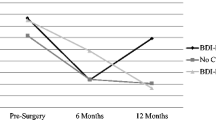Abstract
Background
Long-term outcomes of gastric banding regarding depression and predictors of change in depression are still unclear. This prospective, controlled study investigated depression and self-acceptance in morbidly obese patients before and after gastric banding.
Methods
A total of 248 morbidly obese patients (mean body mass index [BMI] = 46.4, SD = 6.9) seeking gastric banding completed questionnaires for symptoms of depression (Beck Depression Inventory) and self-acceptance. One hundred twenty-eight patients were treated with gastric banding and 120 patients were not. After 5 to 7 years, patients who either had (n = 40) or had not (n = 42) received gastric banding were reassessed.
Results
In the preoperative assessment, 35% of all obese patients suffered from clinically relevant depressive symptoms (BDI score ≥18). The mean depression score was higher and the mean self-acceptance score was lower than those of the normal population. Higher preoperative depression scores were observed among patients living alone and who had obtained low levels of education. After 5 to 7 years, patients with gastric banding had lost significantly more weight than patients without gastric banding (mean BMI loss 10.0 vs. 3.3). Gastric banding patients improved significantly in depression and self-acceptance, whereas no change was found in patients without gastric banding. Symptoms of depression were more reduced in patients who lost more weight, lived together with a partner, and had a high preoperative depression score.
Conclusion
Morbid obesity is associated with depressive symptoms and low self-acceptance. Gastric banding results in both long-term weight loss and improvement in depression and self-acceptance.


Similar content being viewed by others
References
Maggard MA, Shugarman LR, Suttorp M, et al. Meta-Analysis: surgical treatment of obesity. Ann Intern Med 2005;142:547–59.
Buchwald H, Avidor Y, Braunwald E, et al. Bariatric surgery: a systematic review and meta-analysis. JAMA 2004;292:1724–37.
Chapman AE, Kiroff G, Game P, et al. Laparoscopic adjustable gastric banding in the treatment of obesity: a systematic literature review. Surgery 2004;135:326–51.
Crookes PF. Surgical treatment of morbid obesity. Annu Rev Med 2006;57:243–64.
Sjöström L, Lindroos AK, Peltonen M, et al. Lifestyle, diabetes and cardiovascular risk factors 10 years after bariatric surgery. N Engl J Med 2004;351:2683–93.
O’Brien P, McPhail T, Chaston T, et al. Systematic review of medium-term weight loss after bariatric operations. Obes Surg 2006;16:1032–40.
Sjöström CD, Peltonen M, Sjöström L. Blood pressure and pulse pressure during long-term weight loss in the obese: the Swedish Obese Subjects (SOS) intervention study. Obes Res 2001;9:188–95.
Sjöström CD, Peltonen M, Wedel H, et al. Differentiated long-term effects of intentional weight loss on diabetes and hypertension. Hypertension 2000;36:20–5.
O’Brien PE, Dixon JB, Brown W, et al. The laparoscopic adjustable gastric band (Lap-Band): a prospective study of medium-term effects on weight, health and quality of life. Obes Surg 2002;12:652–60.
Fabricatore AN, Wadden TA. Psychological aspects of obesity. Clin Dermatol 2004;22:332–7.
Herpertz S, Burgmer R, Stang A, et al. Prevalence of mental disorders in normal-weight and obese individuals with and without weight loss treatment in a German urban population. J Psychosom Res 2006;61:95–103.
Greenberg I, Perna F, Kaplan M, et al. Behavioral and psychological factors in the assessment and treatment of obesity surgery patients. Obes Res 2005;13:244–9.
Bocchieri LE, Meana M, Fisher BL. A review of psychosocial outcomes of surgery for morbid obesity. J Psychosom Res 2002;52:155–65.
Sarwer DB, Wadden TA, Fabricatore AN. Psychosocial and behavioral aspects of bariatric surgery. Obes Res 2005;13:639–48.
Wadden T, Sarwer D, Womble LG, et al. Psychosocial and behavioral aspects of obesity and obesity surgery. Surg Clin North Am 2001;8:1001–24.
Fabricatore A, Wadden T, Sarwer D, et al. Health-related quality of life and symptoms of depression in extremely obese persons seeking bariatric surgery. Obes Surg 2005;15:304–9.
Wadden TA, Butryn ML, Sarwer DB, et al. Comparison of psychosocial status in treatment-seeking women with class III vs. class I–II obesity. Obesity 2006;14 suppl:90–8S.
Dixon JB, Dixon ME, O’Brien PE. Depression in association with severe obesity: changes with weight loss. Arch Intern Med 2003;163:2058–65.
Herpertz S, Kielmann R, Wolf AM, et al. Does obesity surgery improve psychosocial functioning? A systematic review. Int J Obes Relat Metab Disord 2003;27:1300–14.
Sanchez-Santos R, Del Barrio MJ, Gonzalez C, et al. Long-term health-related quality of life following gastric bypass: influence of depression. Obes Surg 2006;16:580–5.
Burgmer R, Petersen I, Burgmer M, et al. Psychological outcome two years after restrictive bariatric surgery. Obes Surg 2007;17:785–91.
Bryan J, Tiggemann M. The effect of weight loss dieting on cognitive performance and psychological well-being in overweight women. Appetite 2001;36:147–56.
Waters GS, Pories WJ, Swanson MS, et al. Longterm studies of mental health after the Greenville gastric bypass operation for morbid obesity. Am J Surg 1991;161:154–8.
Rydén O, Olsson SA, Danielsson A, et al. Weight loss after gastroplasty: psychological sequelae in relation to clinical and metabolic observations. J Am Coll Nutr 1989;8:15–23.
Hautzinger M, Bailer M, Worall H, et al. Beck depressions inventar. Bern: Huber; 1994.
Sorembe V, Westhoff K. Skala zur Erfassung der Selbstakzeptierung. Goettingen: Hogrefe; 1986.
Huurre T, Eerola M, Rahkonen O, et al. Does social support affect the relationship between socioeconomic status and depression? A longitudinal study from adolescence to adulthood. J Affect Disord 2007;100:55–64.
Rydén A, Torgerson JS. The Swedish Obese Subjects Study—what has been accomplished to date? Surg Obes Relat Dis 2006;2:549–60.
Herpertz S, Kielmann R, Wolf AM, Hebebrand J, Senf W. Do psychosocial variables predict weight loss or mental health after obesity surgery? A systematic review. Obes Res 2004;12:1554–69.
Kinzl JF, Schrattenecker M, Traweger C, Mattesich M, Fiala M, Biebl W. Psychosocial predictors of weight loss after bariatric surgery. Obes Surg 2006;16:1609–14.
Acknowledgement
This study was supported, in part, by Ethicon Endo-Surgery. There are no conflicts of interest.
Author information
Authors and Affiliations
Corresponding author
Rights and permissions
About this article
Cite this article
Schowalter, M., Benecke, A., Lager, C. et al. Changes in Depression Following Gastric Banding: A 5- to 7-year Prospective Study. OBES SURG 18, 314–320 (2008). https://doi.org/10.1007/s11695-007-9316-7
Received:
Accepted:
Published:
Issue Date:
DOI: https://doi.org/10.1007/s11695-007-9316-7




